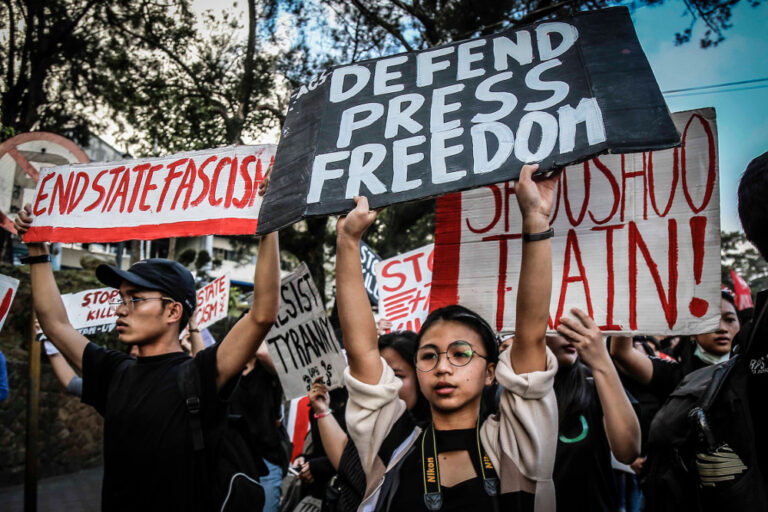
Jun 29, 2022, Jairo Bolledo
Human Rights Watch official Phil Robertson says the move is meant to silence Nobel laureate Maria Ressa and shut down Rappler by hook or by crook
MANILA, Philippines – Two days before outgoing President Rodrigo Duterte steps down from office, the Securities and Exchange Commission (SEC) reaffirmed its decision to revoke the certificates of incorporation of Rappler. Various media and rights groups saw this as an attack against press freedom and expressed their support for the news organization led by Nobel Peace Prize laureate Maria Ressa.
Rappler’s press conference on the SEC’s latest decision.

The National Union of Journalists of the Philippines, a lateral guild promoting press freedom in the country, said the outgoing administration weaponizes the law and other regulatory processes to attack the press.
“Throughout the six years of the Duterte administration, we have seen lawsuits and regulatory processes used as tools to muzzle the press and this, as much as the touted infrastructure projects, form part of the Duterte legacy.”
NUJP ABS-CBN chapter also expressed support for their fellow media workers and said the SEC’s decision is a move to silence Rappler: “There is no other way to interpret this latest move of the Securities and Exchange Commission other than to characterize it as a brazen bid to silence one of the constant critical voices against the administration.”
ABS-CBN, a media giant, lost its franchise under Duterte’s watch. The network was forced to let go thousands of its employees after it was shutdown by the outgoing Philippine president.
In a Twitter post, International Center for Journalists (ICFJ), a nonprofit organization that helps media workers, urged the government to reverse its decision.
“We strongly urge the Philippine government to reverse the decision to shut down @rapplerdotcom, a pioneering digital news outlet that has become one of the only sources of independent news amid a crackdown on #pressfreedom.”
The ICFJ also cited their research, which showed that the attacks on Rappler enable online violence: “This legal harassment not only costs Rappler time, money and energy. It enables relentless and prolific online violence designed to chill independent reporting.”
“Just like the National Telecommunications Commission’s order for the internet service providers to restrict access to the websites of Bulatlat and Pinoy Weekly, the SEC order against Rappler is yet another form of censorship,” the news outlet said. “The recent incidents create a chilling effect and are part of the deliberate efforts to discredit and stifle the press.”
Alternative news network, Altermidya, said the SEC’s move is part of Duterte’s legacy of attacking the press.
“This is part of the Duterte administration’s parting gift before it steps down on June 30: a reiteration of its legacy of unrelenting attacks and hostility towards truth and truth-tellers. Along with this latest attack, President Duterte himself admitted that he ‘used presidential powers’ to shut down ABS-CBN,” it said.
Altermidya added that the attacks against journalists also affect the public’s access to information: “These attacks by the state do not only deliver critical blows to press freedom but also directly attack the people’s right to know by controlling the information that reaches the public – all with the aim to perpetuate itself in power.”
College Editor’s Guild of the Philippines also condemned the SEC’s move.
“Not only does this is a similar move against the recent blocking of websites of alternative media outfits and civic society groups, but also a clear attempt to further muzzle the critical voices, especially against the lies and deceptions of Duterte and the upcoming regime.”
University of the Philippines Diliman journalism professor Danilo Arao noted that the Duterte administration’s latest move is part of the continuous crackdown against the press.
“The attacks against Rappler are part of the intensifying attacks against media which we expect to continue under the administration of the dictator’s son. This is the time not just to hold the line but also to sharpen the line. We push back by fighting back,” Arao said.
‘By hook or by crook’
Human Rights Watch (HRW) deputy Asia director Phil Robertson said that Rappler is facing “retaliation” from the government for its critical reportage of Duterte.
“Rappler is facing government retaliation for its fearless reporting about rights abuses in the ‘drug war’, Duterte and Marcos’ use of disinformation on social media, and a wide variety of rights abusing actions over the past six years. This is an effort to shut up Nobel laureate Maria Ressa, and shut down Rappler, by hook or by crook,” Robertson said.
Robertson added that it’s “predictable” that the government would “bend over backwards” to interpret regulations differently.
“So it’s entirely predictable that the SEC would bend over backwards to interpret rules in a way that would enable them to take Rappler down while spuriously claiming that this is a normal regulatory action. Anyone who has been paying attention knows that’s not the case,” the HRW official said.
Lisa Ito, secretary general of the Concerned Artists of the Philippines, called the latest move against Rappler as an attack on the freedom of expression: “The SEC’s move to revoke Rappler’s paper is censorship by closure, happening on the cusp of a Duterte-Marcos term. It is an attack not only on the institution but to freedom of the press and expression.”
Groups K4 Kilos na para sa Kalusugan, Kabuhayan at Karapatan and Youth Advocates for Climate Action Philippines (YACAP) also expressed support for Rappler. According to YACAP, effective climate action relies on critical media.
“Effective climate action relies on critical journalism that documents and exposes destructive projects, problematic policies, and other issues related to the climate crisis, even if publishing these stories supposedly goes against the politically powerful,” YACAP said. – Rappler.com